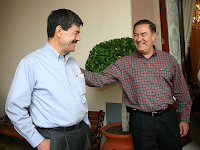
As international attention dribbles toward Ciudad Juárez, Mexico, some advocacy groups are upset with what they consider misdirected attention.
For years, Juarez has been a setting for the disappearance and murder of scores of young women, something relatively unnoticed in international media, say women's groups. Now that the country's escalating drug wars are
attracting world attention, the city is becoming a spotlight for street battles between drug cartels and government forces.
This attention isn't enough, say groups like Ciudad Juárez-based May Our Daughters Return Home. These activists say as many as 500 women have been killed since 1993. Many of the murders have not been solved. The Times
reports today that these women are expressing their anger by protesting the appointment of Mexico's ambassador to Canada, Francisco Barrio Terrazas.
“He doesn’t represent Mexicans,” said Marisela Ortiz, founder of May Our Daughters Return Home, a coalition of victims' families.
Ortiz and others say Barrio Terrazas did not do enough while governor of the state of Chihuahua during the 1990s, when the regular Juárez killings began.
Canada's Embassy magazine
reported that protesters greeted Barrio Terrazas as he arrived in Quebec to begin his new position.
"I was never, never indifferent," Barrio Terrazas said in the Embassy articlce. "Never insensitive towards those cases. Those were happenings that affected me extremely, there was a huge concern from me."
In related news, two members of the Mexican Army are accused of
torturing Juárez residents to find the name of a local drug dealer. Also, an El Paso man was arrested
last week for the alleged rape of 19 young women in Juárez.
Sources: NYT, Embassy, El Diario de Juárez, LA Times, AP
Photo: Francisco Barrio Terrazas with Francisco Garrido, http://gobilv9703.queretaro.gob.mx






